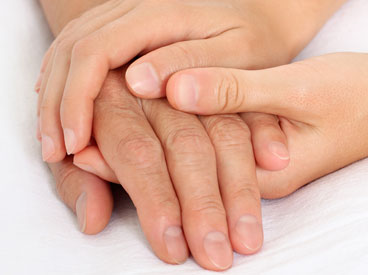Devra Lee Fishman’s dear friend and college roommate, Leslie, died from breast cancer one month shy of her 46th birthday after a four-year battle with the disease. Being with Leslie and her family at the end of her life inspired Devra to help care for others who are terminally ill. Each week, she documents her experiences volunteering at her local hospice in her blog, Hospice Girl Friday.
“You might not want to go into room four,” the nurse warned me as I looked over the list of patients.
“Why not?” I asked.
“Well,” the nurse said, lowering her voice and leaning in. “The patient, Mr. Kennerly*, has some sort of face cancer that made his tongue huge. So huge it doesn’t fit in his mouth. It kind of hangs out like this,” she said, sticking out her tongue as far as she could and closing her lips around it.
“That doesn’t seem so bad,” I replied, although my voice sounded more like a question than a statement. The nurse continued.
“Well, because his tongue is so swollen, he can’t swallow. So he basically drools a thick, gooey mess all the time, and he has to breathe through a hole in his neck. You might not want to see that, and I’m not sure how much he wants visitors. It’s up to you.”
As soon as I arrive I check the patient list and read through the notes that other volunteers made. I make a cheat sheet of who is in what room, and I ask the nurses on duty if there is anything I should know before I make my rounds, knocking on patients’ doors and asking if I can help in any way. Usually the answer is ‘no.’ Most patients are comfortable and know that if they want anything, they can just ring the call bell and either a nurse’s assistant or a volunteer will answer.
“Um, okay,” I say, “thank you for telling me.” I want to say “thank you for the warning,” but don’t want her or anyone else to know I am still a little tentative around patients. “Anything else I should know?”
“No, everyone else is either resting or sleeping, and I am about to check on room 8. Time for her meds,” the nurse said. As she turned to leave, I looked at the cover sheet for Mr. Kennerly. Forty-two years old. Arrived five days prior from a rehab facility. Primary contact: his father.
I did not knock on Mr. Kennerly’s door when I walked around to say hello to the patients, and I was relieved when his father came to visit about an hour into my shift. That meant that if Mr. Kennerly needed anything, his father would convey the message to me. I didn’t hear from either one of them before I left for the day.
The following Friday, Mr. Kennerly was still there. As I settled in, a nurse told me that Mr. Kennerly’s father would be picking him up within the hour to take him to a doctor’s appointment. I read through the volunteer notes and saw that several people checked in on him throughout the week. They wrote that Mr. Kennerly was very friendly and seemed content playing video games and texting his friends. I wondered if the nurses warned all of them or if there was some reason they felt a need to protect me. Before I had a chance to ask, Mr. Kennerly’s call bell rang.
I walked into his room and asked what I could do to help. Mr. Kennerly was standing by his bed and he looked exactly as the nurse described. He was chubby, like a teddy bear, wearing sweatpants and a T-shirt. Around his neck, to catch the drool, was a large paper bib, which made him look like he just escaped from the dentist office, mid-cleaning. His face was pointing downward even though his eyes were looking at me. I don’t think he could move his neck very much.
“Hi there, Mr. Kennerly,” I said. “How can I help you today?”
He grunted and pointed to his sneakers on the floor.
“You want to put on your sneakers?”
He grunted and gave a small nod, still pointing.
“Okay, have a seat,” I said, reaching for the shoes. His feet and ankles were swollen like he was wearing boots under his white socks. I stretched the laces of his left sneaker as wide as I could and urged it onto his foot. When I started to tighten the laces he grunted again. I looked up to see him swivel his head slightly from side to side. “Don’t tie the laces?” He gave another grunt. No.
“Got it. Other foot,” I said, as I reached for the right sneaker, stretched it open, and guided it onto his foot.
“Is your father on his way?”
Same grunt. Yes.
“Is there anything else I can get for you before I go?”
Mr. Kennerly stood up and took hold of my right arm with his left hand. I thought he might need me to help him walk outside so I started to turn toward the door. That’s when Mr. Kennerly grabbed my right hand with his, pulled me toward him and gave my hand—and entire arm—a strong shake as he grunted quietly and looked into my eyes. Thank you.
I gave him a quick hug before I left, careful not to disturb his bib or jar his neck and made a mental note to try not to let other people’s fears cause my own.
*Names have been changed to protect patient privacy.
Previous post: Receiving Thanks Next post: Learning How to Listen
Become a Saturday Evening Post member and enjoy unlimited access. Subscribe now



